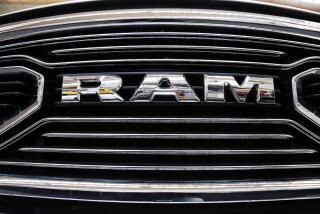Senators accuse GM of coverup in delayed ignition-switch recall
WASHINGTON -- Senators aggressively questioned General Motors Co. Chief Executive Mary Barra on Wednesday about the years of delays in recalling vehicles with faulty ignition switches, accusing the company of a coverup to hide the problem that caused at least 13 fatal accidents.
“I think it’s pretty much incontrovertible that GM knew about this safety defect, failed to correct it ... and then concealed it from the courts and the United States,” Sen. Richard Blumenthal (D-Conn.) told Barra during a hearing by a Senate Commerce subcommittee.
The panel’s chairwoman, Sen. Claire McCaskill (D-Mo.), referred to a “culture of coverup.”
And Sen. Kelly Ayotte (R-N.H.) said that revelations that GM redesigned the switch in 2006 but kept the same part number as the faulty switch that was installed in millions of vehicles “strikes me as deception.”
Barra has called the failure to identify the redesigned switch as a new part was “unacceptable.”
Ayotte said: “I think it goes beyond unacceptable. I believe this is criminal.”
The Justice Department has started a criminal investigation into whether GM purposely withheld information about the faulty ignition switch.
Internal documents show the company knew about problems with the switch for at least a decade, but recalls did not begin until February.
GM has recalled about 2.6 million vehicles globally so far to replace the switch, which unintentionally can turn off the vehicle, disabling the power steering and airbags.
[Updated, 11 a.m. PDT April 2: In a statement released by GM after the hearing, Barra said the issues raised at the hearing were “tough but fair.”
“I appreciate the intense interest by the senators to fully understand what happened and why,” she said. “I am going to accomplish exactly that, and we will keep Congress informed.”]
Testifying on Capitol Hill for the second straight day, Barra reiterated she wanted to know if GM engineers covered up the problems or were just incompetent. She said a recently launched internal investigation by former U.S. Atty. Anton “Tony” Valukas would help determine that.
“He has the free rein to go where the facts take him, regardless of outcome,” Barra told senators. “The facts will be the facts. Once they are in, my leadership team and I will do what’s necessary to insure this doesn’t happen again.”
But senators criticized Barra for deflecting questions about the problem by saying she needed to wait for the completion of the internal investigation.
And some said they were surprised Barra, who was a top GM executive for years before becoming CEO in January, wasn’t aware of the ignition switch issue until late last year.
“You’re a really important person to this company. Something is very strange that such a top employee would know nothing,” said Sen. Barbara Boxer (D-Calif.).
“You don’t know anything about anything,” Boxer later added.
McCaskill said GM withheld information about the defect from a private attorney investigating a fatal 2005 accident involving a recalled GM model, the Chevrolet Cobalt.
And she criticized Barra for not firing the GM employee, Ray DeGiorgio, who signed a 2006 memo redesigning the ignition switch even though he swore during a legal deposition that he knew nothing about the change.
“It is hard for me to imagine you would want him anywhere near engineering anything at General Motors under these circumstances,” said McCaskill, a former prosecutor.
Barra said it appeared DeGiorgio had lied in the deposition, but that neither he nor anyone else at GM has been fired for the recall delay.
The company also has hired Kenneth Feinberg, who helped determine compensation for victims of the Sept. 11 terrorist attacks, the Boston Marathon bombing and other high-profile cases.
Feinberg will advise the company on options for handling compensation demands by families of victims of crashes in recall vehicles that took place before GM’s 2009 bankruptcy restructuring.
“Why not just come clean and say …we’re going to do the right thing, we’re going to compensate the victims?” Blumenthal asked Barra.
She said that the company retained Feinberg because it believes it has “civic as well as legal responsibilities.” But she would not commit to compensation until Feinberg finishes his work.
[Updated, 11 a.m. PDT April 2: The switch issue will cost GM up to $3.5 billion, said Brian Johnson, an analyst with Barclays Capital.
Johnson’s estimate includes a $1-billion trust for plaintiffs involved in accidents in the affected vehicles that occurred prior to the 2009 bankruptcy and restructuring of the automaker and an additional $500 million in expenses related to accidents after GM emerged from bankruptcy.
Most bankruptcy experts believe that the restructured GM is shielded from liability for crashes in the cars prior to the bankruptcy, but Johnson’s view is that the automaker will set aside money for those victims regardless.
The automaker already has set aside $750 million to pay for recall repairs, and much of that money will be spent on fixing cars with the faulty switches.
Johnson said GM will be dealing with the switch issue for some time, but that for now it has not eaten into the company’s U.S. sales.
“There will be a long and protracted process before resolution is reached on the recall,” he said.
Barra’s testimony, he said, “reinforced the complexity of GM’s organization, given commentary that one of the causes of the long-delayed recall was the lack of communication between departments.”
He said the restructured GM has worked to streamline its organization.
“However, it is clear that more work must be done in streamlining the organization,” Johnson said. “Barra’s proactive response to the situation indicates greater accountability within the company.”]








